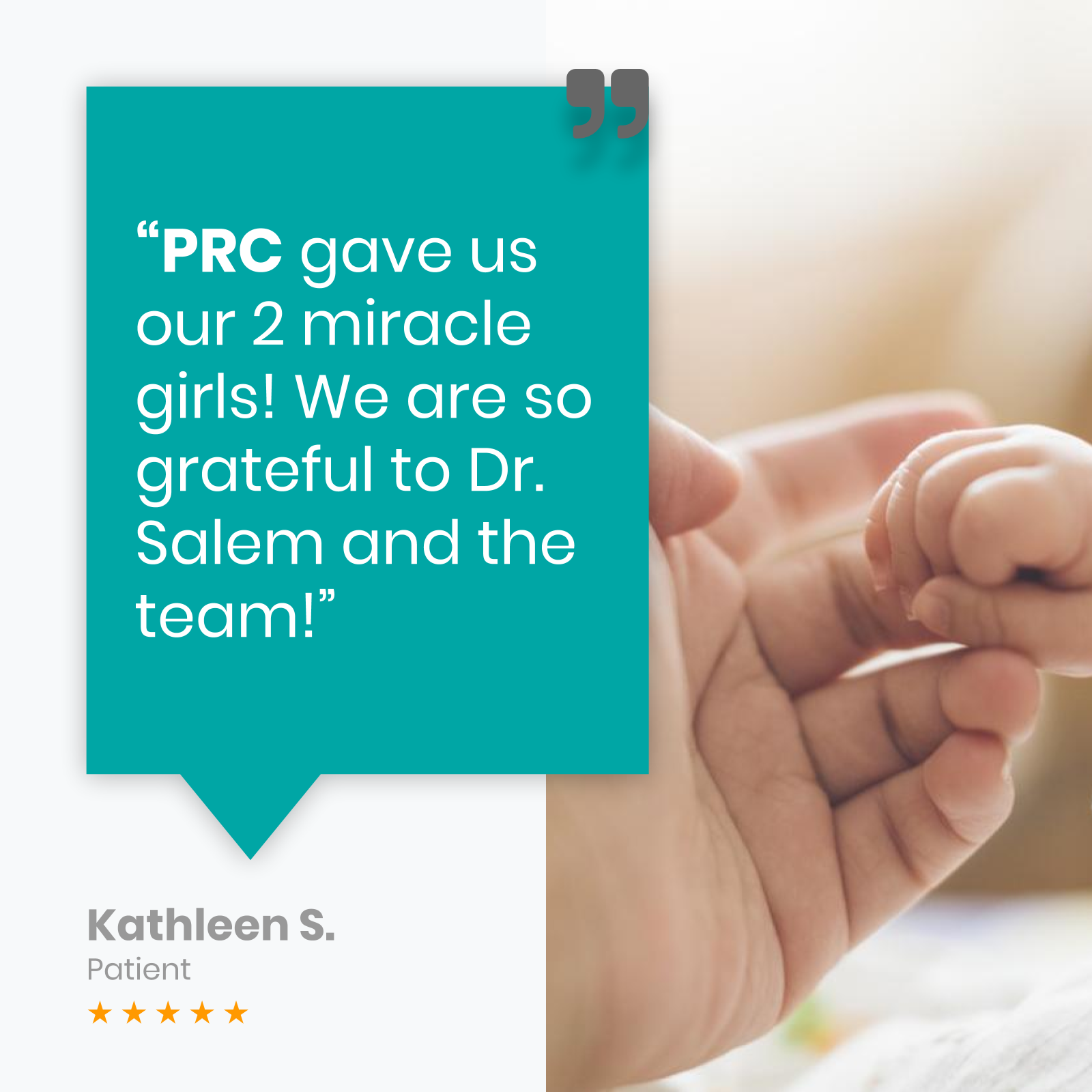Deciding when to begin in vitro fertilization (IVF) is a deeply personal choice, but timing can play a significant role in your success.
One of the most frequently asked questions our team hears is, “What is the best age for IVF treatment?”
While fertility can vary from person to person, there are general trends in how age affects egg quality, success rates, and treatment planning.
At Pacific Reproductive Center, we provide compassionate, personalized guidance to help you make the most informed decisions tailored to your goals, medical history, and fertility timeline. Continue reading or contact our team to learn more about age and fertility.
Age and IVF Success Rates: What You Need to Know
When it comes to in vitro fertilization and age, understanding how fertility changes over time can help you determine the best path forward.
How Age Affects IVF Success
As women age, both the quantity and quality of their eggs naturally decline. This reduction impacts fertilization, embryo development, and implantation, all of which are critical to a successful IVF outcome.
That’s why the best age for IVF often falls within a specific window of reproductive health.
The Impact of Age on Egg Quality and Fertility
Egg quality declines more rapidly after age 35, making it harder to conceive and increasing the risk of chromosomal abnormalities.
By the early 40s, fertility continues to decrease, and IVF success rates begin to decline more significantly. That said, each person’s fertility journey is unique, and many individuals over 40 do go on to conceive with IVF.
What Is the Best Age for IVF Treatment?
The ideal age for IVF is typically between 25 and 35 years old, when fertility is at its peak and egg quality is higher. IVF success rates tend to be higher in this age group, and treatment may require fewer cycles.
That said, many older people pursue IVF, often successfully, with the help of tailored strategies like preimplantation genetic testing (PGT) or donor eggs.
Age Limitations and Risks of IVF
While there’s no official upper age limit for IVF, most clinics recommend treatment before age 45 using one’s own eggs. After this point, donor egg IVF is typically advised.
Age can also increase the risks of:
- Gestational complications (e.g., preeclampsia).
- Chromosomal abnormalities.
At Pacific Reproductive Center, we evaluate each client individually and help manage age-related risks through comprehensive testing and personalized care.
IVF Success Rate by Age
IVF success rates vary significantly by age, mainly due to changes in egg quality, quantity, and overall reproductive health. Here’s an overview by age:
- Women under 35 typically experience success rates of 40 to 50% per cycle, with higher-quality eggs and lower risk of chromosomal abnormalities.
- Women aged 35 to 40 see success rates of around 25 to 40%, and often benefit from enhanced monitoring, fertility medications, or personalized protocols.
- Women over 40 generally have lower success rates, ranging from 5 to 15% per cycle, when using their own eggs. However, success increases with the use of donor eggs and targeted treatment adjustments.
Outcomes also depend on factors like hormone levels, uterine health, and lifestyle choices. Your fertility specialist will consider all of these when creating your personalized IVF plan.
Factors to Consider When Choosing the Right Time for IVF
The right age for IVF depends on more than just the calendar. Deciding when to start treatment involves weighing your personal goals, medical history, and fertility health.
Some key factors include:
- Your current ovarian reserve.
- Relationship or family-building readiness.
- Financial and emotional preparedness.
- Past pregnancies or fertility treatments.
- The results of fertility evaluations.
Starting IVF at the ideal time can maximize your chances of success and reduce the need for repeated cycles. At PRC, we help you assess all these considerations with a customized, supportive approach.
The Role of Fertility Testing in Deciding When to Start IVF
Fertility testing is a vital first step in understanding your reproductive timeline.
By assessing your IVF candidacy based on age and hormone levels, our team can provide guidance tailored to your body’s current fertility status.
Tests that help determine IVF timing include:
- AMH (Anti-Müllerian Hormone): Indicates ovarian reserve.
- FSH (Follicle-Stimulating Hormone): Evaluates egg quality and response to stimulation.
- Antral Follicle Count (AFC): Assesses how many follicles are present in your ovaries.
These results help you and your provider decide whether it’s time to begin IVF or consider options like egg freezing or fertility preservation.
Overcoming Age-Related Fertility Challenges with IVF
Age can influence IVF outcomes, but advanced reproductive technology makes it possible to overcome many of these challenges.
At PRC, we offer supportive strategies that help clients of all ages improve their IVF success rates.
IVF and Egg Freezing: A Strategy for Delaying Parenthood
If you’re not ready to start a family now but want to preserve the option for later, egg freezing is a proactive solution. This process allows you to store younger, healthier eggs for use in a future IVF cycle, often resulting in better outcomes.
Egg freezing is most effective in your 20s or early 30s, but may still be viable later with proper evaluation.
How to Improve Your IVF Chances with Age-Related Challenges
Even with age-related fertility declines, IVF success is possible, especially with the right plan.
Ways to improve your chances of conceiving include:
- Using fertility medications to increase egg production.
- Considering preimplantation genetic testing (PGT) to select healthy embryos.
- Adjusting the timing of egg retrieval and embryo transfer.
- Exploring donor egg options if needed.
Visit Pacific Reproductive Center for Personalized IVF Treatment
At Pacific Reproductive Center, we understand that age is just one piece of your fertility story.
Whether you’re in your late 20s, mid-30s, or early 40s, we’re here to help you make empowered decisions about IVF timing and treatment.
We offer:
- Expert fertility testing and IVF evaluation.
- Guidance on fertility medications and egg health.
- Proven strategies for IVF and age-related challenges.
- Personalized plans that align with your goals and timeline.
Ready to get started on fertility treatment? Explore our IVF frequently asked questions or schedule a consultation to begin your fertility journey with a team that genuinely cares.
Treatments
Pacific Reproductive Center has been successfully aiding conception for over two decades. We optimize the conditions of fertility treatment to give every potential parent the greatest chance of successful childbirth.
Resources
We ensure that every patient fully understands their medical condition and treatment options available to them. We understand each patient is unique so we help guide you through the best option to support your own fertility journey.
Looking for the Best Fertility Clinic in Southern California?
Pacific Reproductive Center has four convenient locations throughout Southern California, making it easy for patients to receive quality care close to home. Each IVF fertility center has an on-site lab, next-generation services, and state-of-the-art equipment.
Whether in Glendale, Torrance, Irvine, or Corona, our world-class fertility doctors can help you build the family you’ve always wanted.
3720 Lomita Blvd, Suite 200 Torrance, CA 90505
116 E. Broadway, Suite 300 Glendale, CA 91205
10 Post Irvine, CA 92618
381 Corporate Terrace Corona, CA 92879




